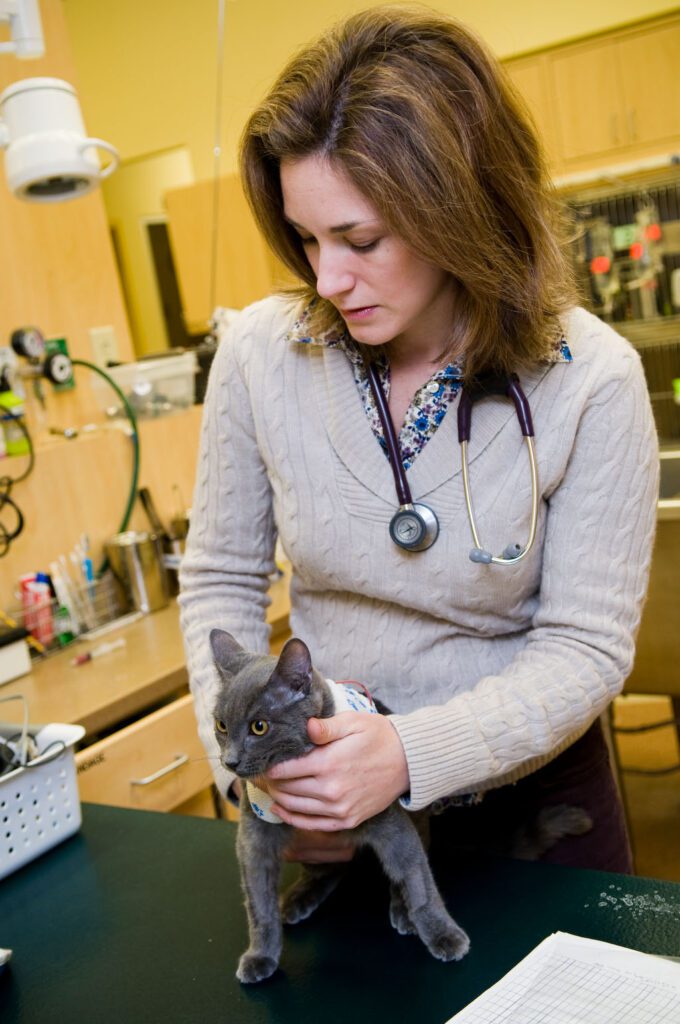Handling a Pet Toxin or Poisoning Emergency

My pet just got into something he shouldn’t have. What should I do?
This could be the shortest blog post ever. The answer:
- Call your veterinarian or the nearest emergency veterinary hospital.
- If #1 is not possible, call Poison Control. ASPCA Animal Poison Control (888) 426-4435
Perhaps you’ve been through a similar situation in the past. Perhaps your sister has. Perhaps your neighbor’s son’s friend worked in a veterinary practice for a few months three years ago. This is what we’ll tell you: Unless the advice you are given is the two steps above — DON’T USE IT.
What your pet ate may be fine, and we get plenty of false alarms here. A call will never hurt, and is certainly quicker and more accurate than getting several dozen opinions from your friends, family, neighbors, and Dr. Google.
When you call, your vet (or Poison Control) will need to know:
- the name of the substance
- the strength of the product if known (medication, chemical, etc.)
- how much was consumed
- how long since you think the consumption occurred
- age, breed, and approximate weight of your pet
Can’t I just make my pet vomit?
No.
Do not give your pet any ‘antidotes’ unless instructed to do so by your veterinarian or poison control. Some substances will cause even more harm if you make your pet vomit. Some have even more risk if your pet inhales some of the substance while vomiting. Once, memorably, we encountered a substance that, when mixed with the stomach acid of the dog, could potentially have created a gas that was extremely dangerous to all of us in the hospital if we had released the gas by making the dog vomit. Some substances will need to be neutralized with specific antidotes that a veterinary hospital will have access and the tools to administer.
Here at VMC, poisonings and toxicities are what we deal with day in and day out. We are very comfortable handling these cases and are easily able to properly guide a pet owner through this process. While some cases are very routine and we know exactly what to do immediately, we commonly utilize the resources of Animal Poison Control. New products, drugs, and chemicals are created all the time, and so the potential toxins and combinations of toxins in common household items can change so rapidly. So can the antidotes and treatments. The ASCPA Animal Poison Control service stays current with the newest information that can make all the difference in saving a pet’s life.
WORTH REPEATING ONE MORE TIME: DO NOT MAKE YOUR PET VOMIT UNLESS YOU HAVE EXPLICIT INSTRUCTIONS FROM YOUR VETERINARIAN OR POISON CONTROL.

Some general tips:
Be Honest. We know what a dog that ate marijuana looks like and acts like. We can run a whole bunch of tests that will tell us what we already suspect (and waste time and cost you money you don’t really need to spend), or you can just tell us the truth. It’s OK. We won’t judge. We just want to help your pet, and the sooner we can do that the better. And no, it is not, not, NOT OK to intentionally “share” with your pet. They do not react the same way to recreational drugs, and it is cruel to do that on purpose. Not funny. Not ever.
Drugs and Chemicals (rodent poisons, insecticides, antifreeze, recreational drugs, human pharmaceuticals) are potentially the most harmful poisons as they are often in a very concentrated form. Your pet may only need to consume a small amount for it to have a significant effect.
Cats tend to be more susceptible to poisons than dogs. Fortunately, cats are normally less likely to eat something unfamiliar. If toxic exposure does occur, cats may be more at risk, as their metabolism is less able to process many toxins (acetaminophen, permethrin, and plant poisons) that are somewhat less dangerous for dogs. Be aware that cats are at high risk for ingesting contaminants on their fur, however, due to their grooming habits.
The most common sources of toxins for pets, according to the ASPCA are: prescription and over-the-counter drugs (both human and pet drugs), insecticides and insect baits, common household plants, rodenticides and baits, and common household cleaners including bleach, detergents, and disinfectants. We see all of those problems at VMC, and would also add chocolate, xylitol, and recreational drugs to the list.
What should I include specifically for this in my pet’s first-aid kit?
The ASPCA Animal Poison Control Center experts recommend the following to keep on hand in case of toxins:
- Fresh bottle of hydrogen peroxide, 3 percent USP (to induce vomiting)
- Turkey baster, bulb syringe or large medicine syringe (to administer peroxide)
- Saline eye solution
- Artificial tear gel (to lubricate eyes after flushing)
- Mild grease-cutting dishwashing liquid (for bathing an animal after skin contamination)
- Forceps (to remove stingers)
- Muzzle (to protect against fear- or excitement-induced biting)
- Can of your pet’s favorite wet food
- Pet carrier
Always consult a veterinarian or the APCC for directions on how and when to use any emergency first-aid item. We also suggest that you keep the telephone number of the ASPCA Animal Poison Control Center—(888) 426-4435—as well as that of your local veterinarian in a prominent location.
About Us
At Veterinary Medical Center of Central New York, we understand that the health of your pet is a top priority. In the case of an emergency or a condition requiring specialized care, we're here to treat your pet in our state-of-the-art, 24-hour Emergency and Critical Care Center.
